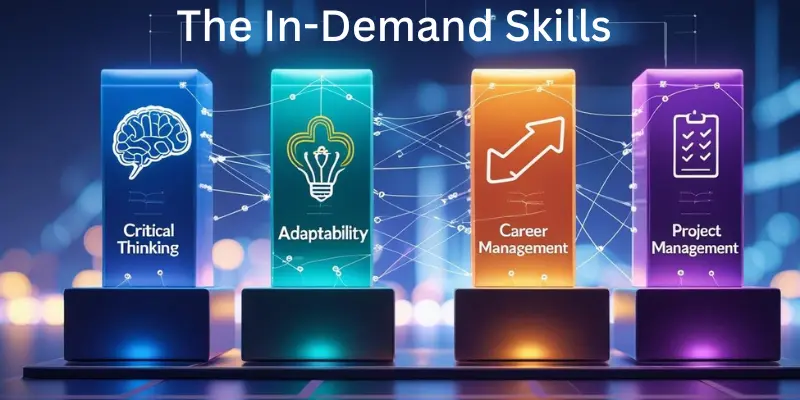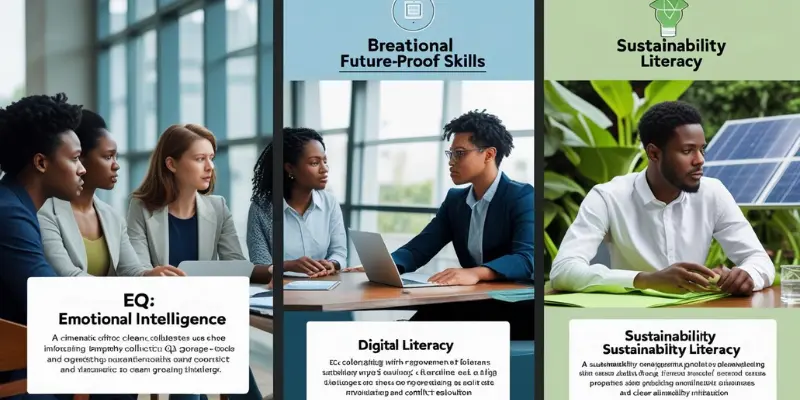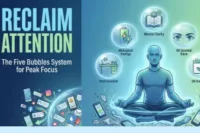The Ultimate Transferable Skills Checklist for Students (Examples & Guide)
Published: 13/08/2025
Feeling under-qualified for your dream job because you lack “professional experience“?
You’re not alone. Many students and recent grads share this frustration. It’s a common belief that only full-time, industry-specific jobs count as experience, but this couldn’t be further from the truth. The reality is that your part-time jobs, internships, volunteer roles, and even the campus activities you’ve participated in have likely given you a wealth of valuable skills that employers are looking for.
It’s easy to feel like you’re not ready for a career, but you’ve probably already developed the transferable skills that can land you that perfect job. These skills are the versatile abilities that can be applied across different roles and industries, from communication and problem-solving to teamwork and adaptability.
This guide is designed to show you exactly how to identify, articulate, and use these powerful transferable skills. Whether you’re working part-time at a coffee shop, collaborating on group projects, or leading a campus club, the experience you’ve gained is more valuable than you think. We’ll provide you with an ultimate checklist of key transferable skills, concrete examples to back them up, and expert tips to help you reframe your resume and stand out to employers.
By the end of this guide, you’ll have the confidence to showcase the skills you already possess and transform them into career-boosting assets. Let’s dive in and discover the skills that will get you hired.
What is a Transferable Skill (and Why You Already Have Them)
Your journey to career confidence begins here. Before you can start building your transferable skills checklist, it’s important to understand what these skills are and why they matter. Transferable skills are the abilities you’ve gained from any experience—whether it’s coursework, part-time jobs, internships, or extracurricular activities—that can be applied across different jobs and industries.
The Simple Definition: Hard Skills vs. Soft Skills
Let’s break it down:
- Hard Skills: These are specific, teachable abilities that are often technical or measurable. Think of things like coding, data analysis, or foreign language proficiency. These skills are usually the ones that are listed on your resume and can be easily quantified.
- Soft Skills: These are the more personal traits and behaviors that you develop through experience, often linked to how you interact with others. Examples include communication, teamwork, adaptability, and problem-solving. While they’re harder to quantify, soft skills are just as, if not more, important in many job roles.

While both hard and soft skills matter, transferable skills are typically soft skills—skills that can be transferred from one job or situation to another. For instance, your ability to collaborate effectively on a class project is a transferable skill that can be used in virtually any job, even if that job is in an entirely different field.
Why Employers Value These Skills
Employers aren’t looking to spend months teaching you basic skills like communication, time management, or problem-solving. Instead, they want new hires who can hit the ground running. That’s where transferable skills come in. These skills are essential because they show that you can adapt to different work environments, take initiative, and solve problems without extensive training.
In fact, a recent study found that 92% of hiring managers prioritize transferable skills over technical skills when making hiring decisions for long-term success. Employers are more likely to hire someone who can think critically, work well with a team, and manage projects efficiently—even if they don’t have all the technical know-how yet. These qualities are often harder to teach, so they’re highly valued in the recruitment process.
By identifying and highlighting your transferable skills, you show employers that you’re not only ready for the job at hand but also prepared to grow and adapt in the future. So, even if you’re missing out on a specific technical skill, don’t worry—your transferable skills might just be the ticket to your next opportunity.
The Ultimate Transferable Skills Checklist for Students
This section is the core of your guide. We’re going to break down the most essential transferable skills you’ve likely gained during your student life and student employment. These skills will help you stand out to employers and set you on the path to career success.
The Foundational Skills
These are the basic but critical skills that apply to nearly every job. No matter where you work or what you do, these skills are essential:
Communication (Verbal and Written)
- Whether it’s presenting ideas in class, writing essays, or emailing professors, communication is something you practice daily as a student. Being able to express yourself clearly—both in writing and speaking—is crucial in almost every role. Employers want someone who can articulate ideas effectively and collaborate across teams.
Example: Whether you’re drafting an email to a professor or contributing in a team project, being able to communicate your ideas clearly is a skill that translates into any professional setting.
Teamwork
- In group assignments, sports teams, or club activities, you’ve likely had to work alongside others. The ability to make positive contributions to a group—by listening, offering support, and compromising—is something employers highly value. In the workplace, teamwork ensures that objectives are achieved efficiently and harmoniously.
Example: If you’ve worked on a team project or group presentation, you’ve already demonstrated how to work collaboratively to meet deadlines and deliver quality results.
Problem-Solving
- As a student, you encounter challenges, whether it’s understanding a difficult topic or fixing a technical issue with your coursework. The ability to identify issues and find logical solutions is a critical skill that employers seek. Being resourceful and thinking critically can help you solve workplace challenges with efficiency and creativity.
Example: Whether troubleshooting a technical issue with your laptop or finding a solution for a group project obstacle, problem-solving is an invaluable skill in any career.
Work Ethic
- Employers want employees who are reliable and show initiative. Your ability to balance academic commitments, extracurriculars, and part-time work demonstrates work ethic. This skill shows that you can handle multiple tasks, meet deadlines, and remain productive without constant supervision.
Example: Juggling a part-time job, schoolwork, and volunteering proves that you can stay disciplined and motivated in high-pressure situations.
The In-Demand Skills
These in-demand skills are highly sought after in today’s competitive job market. Mastering these will help you stand out from the crowd:
Critical Thinking
- Employers value employees who can analyze complex situations and make informed decisions. Critical thinking allows you to break down problems and evaluate potential solutions logically. Being able to approach problems from various angles will help you solve even the toughest challenges.
Example: In your academic projects, when you break down an issue and come up with a well-reasoned solution, you demonstrate critical thinking—a skill that’s valuable in any industry.
Adaptability
- The world of work is constantly changing. Adaptability is the ability to adjust to new conditions, whether it’s a shift in work priorities, a new technology, or changing deadlines. Employers need individuals who can handle change and stay effective, even when things aren’t going as planned.
Example: Whether you’ve had to adapt to new software in class or adjust to a last-minute project deadline, your ability to stay flexible shows employers you can thrive in unpredictable environments.
Leadership
- Even if you’re not managing a team, leadership skills are important. It’s about taking the initiative, motivating others, and achieving goals together. Whether you’re leading a student club, a group project, or organizing an event, showing leadership demonstrates that you can take charge and inspire others to get things done.
Example: Taking the lead on a group project or organizing a campus event shows you can drive initiatives forward and work collaboratively toward common goals.
Project Management
- Employers want to know that you can take an idea and manage tasks from start to finish. Project management skills help you break down big projects into manageable pieces, set timelines, and track progress. Being able to coordinate people and resources effectively is essential in almost every career.
Example: Whether you’ve organized a fundraiser or coordinated a class project, your ability to plan, execute, and track results shows employers you can handle complex tasks.

The Future-Proof Skills
These are the modern skills that will become even more important in the coming years. They will set you apart as someone prepared for the evolving job market:
Emotional Intelligence (EQ)
Emotional Intelligence (EQ) is the ability to manage your own emotions and understand others’ emotions. It’s about handling stress, resolving conflicts, and building strong interpersonal relationships. EQ is a crucial skill in the workplace because it helps you collaborate effectively, deal with challenging situations, and maintain a positive work environment.
Example: When you remain calm and composed during a stressful class or conflict with a group member, you’re showing high emotional intelligence—something that will help you in any work environment.
Digital Literacy
With technology driving most industries today, digital literacy—being proficient with various software, platforms, and tools—is essential. Employers expect new hires to have a working knowledge of basic digital tools and be able to adapt to new technologies quickly.
Example: Being comfortable with digital platforms like Microsoft Office, Google Suite, or project management tools like Trello will make you an asset to employers in any field.
Sustainability Literacy
- In today’s world, understanding sustainability—the social and environmental impact of business practices—is becoming increasingly important. Employers are seeking individuals who can contribute to their sustainability efforts, whether it’s through eco-friendly practices or supporting corporate social responsibility initiatives.
Example: If you’ve participated in sustainability-related campus activities or projects, you’re already familiar with concepts that are growing in demand in the job market.

Transferable Skill Examples in Action
Now that you’ve got your transferable skills checklist, let’s bring those skills to life with real-world examples from your student life. These examples will help you see how your everyday experiences have equipped you with valuable skills that employers are looking for.
From Your Classes and Academics
Your academic experiences—whether in the classroom or during independent study—are a treasure trove of transferable skills. Here’s how you can connect them to key skills:
How Writing a Research Paper Demonstrates Analytical Skills and Attention to Detail
Writing a research paper isn’t just about putting words on a page. It requires analytical skills to break down complex concepts, research thoroughly, and synthesize information. Throughout this process, you also develop attention to detail, ensuring your arguments are supported by evidence and your citations are accurate. These are the same skills you’ll use to analyze data, evaluate situations, and create reports in the workplace.
Example: When writing a research paper, you don’t just gather information—you evaluate its credibility, synthesize findings, and make sure your argument is logically sound. This demonstrates your ability to think critically and pay close attention to detail—skills valued in any professional setting.
How Group Projects Showcase Collaboration and Time Management
Group projects are a prime example of how you can build collaboration and time management skills. Whether you’re working with a team to develop a presentation or creating a group report, you have to balance multiple ideas, meet deadlines, and coordinate with others. This involves communicating effectively, listening to others, and dividing tasks efficiently to ensure that the project is completed on time.
Example: In a group project, you may be tasked with compiling research, creating slides, and preparing for the presentation. Your ability to work with others and manage multiple responsibilities within a tight deadline shows employers that you can handle collaboration and time-sensitive tasks at work.
From Your Student Jobs and Campus Activities
Your student jobs and campus activities offer even more chances to showcase your transferable skills in action. These experiences often involve real-world problem-solving, leadership, and communication—skills highly prized by employers.
Personal Anecdote: The Time I Worked as a Barista on Campus
“I worked as a barista on campus, and one day the coffee machine broke down during the morning rush. I didn’t just wait for someone else to fix it—I took the initiative to troubleshoot the problem. Not only did I solve the issue, but I also learned problem-solving on the spot, keeping the flow of customers going smoothly.”
This anecdote highlights problem-solving—a crucial transferable skill. It also shows initiative, which is key in any job. Taking charge of a situation like this demonstrates your ability to think on your feet and handle unexpected challenges.
How Working Retail Builds Communication and Problem-Solving
If you’ve worked in retail, you know that communication is key. Whether you’re explaining product features to customers or handling returns, you’re constantly interacting with people. Additionally, working in retail means you often face unexpected problems—from customer complaints to stock shortages. The ability to address these challenges, find solutions, and communicate them effectively shows you’re ready for customer-facing roles in any industry.
Example: Working as a cashier or customer service representative, you have to listen to customers, understand their needs, and provide a solution quickly and professionally. These experiences develop communication skills and problem-solving abilities, both of which are essential in almost every job.
How a Leadership Role in a Club Demonstrates Leadership and Project Management
Being in a leadership position in a student club (or any organization) teaches you a lot about leadership and project management. As a leader, you’re tasked with motivating a team, delegating tasks, and overseeing the progress of projects—skills that translate directly into the workplace. Whether you’re organizing events or leading meetings, you’re developing the ability to manage teams and projects effectively.
Example: If you were the president of a student club and organized an event, you demonstrated leadership by making decisions, motivating others, and ensuring that everything ran smoothly. You also showed project management skills by planning, delegating, and executing the event from start to finish.
How to Use Your Checklist to Get Hired (Expert Tips)
Now that you’ve identified your transferable skills and have a solid checklist, it’s time to turn those skills into results—something that will impress employers and set you apart in your job search. In this section, we’ll walk through specific strategies for leveraging your transferable skills on your resume, in interviews, and on your LinkedIn profile.
Resume Power-Up: Using Action Verbs
A great resume doesn’t just list your job duties—it showcases your achievements in a way that grabs attention. One of the most effective ways to do this is by quantifying your accomplishments using action verbs. Action verbs convey the results you achieved and demonstrate your initiative and leadership.
Example:
Instead of writing, “I did marketing,” write something like, “I managed social media campaigns, increasing engagement by 20%.”
This version tells the employer exactly what you did, how you did it, and the impact of your work. It provides measurable results, showing the employer that you can achieve tangible outcomes.
- Other Action Verbs to Consider:
- Led
- Developed
- Increased
- Implemented
- Improved
- Coordinated
- Enhanced
By using action verbs and including specific outcomes (like percentages, dollar amounts, or time saved), you give employers concrete evidence of your transferable skills in action.
The STAR Method for Interviews
The STAR method is one of the most effective ways to structure your answers during an interview. It helps you communicate your experiences in a clear, concise, and compelling way. STAR stands for:
- Situation: Describe the context or challenge you were facing.
- Task: Explain the task or responsibility you had in that situation.
- Action: Outline the steps you took to address the situation or task.
- Result: Share the outcome of your actions, emphasizing any successes or achievements.
Simple Fictional Example:
Let’s say you led a campus group event. Here’s how you could use the STAR method to describe your leadership experience:
- Situation: “Our student club wanted to host a charity event, but we faced a tight budget and a short timeline.”
- Task: “I was responsible for planning the event, organizing volunteers, and securing sponsors.”
- Action: “I coordinated with local businesses for donations, delegated tasks to club members, and promoted the event through social media.”
- Result: “As a result, we raised $3,000 for the charity and attracted 150 attendees, exceeding our fundraising goal by 50%.”
By structuring your answers with the STAR method, you provide interviewers with clear examples of your transferable skills in action. You also demonstrate your ability to solve problems and achieve results, which employers love.
Your LinkedIn Profile: Show, Don’t Just Tell
Your LinkedIn profile is more than just a digital resume—it’s a powerful tool for showcasing your transferable skills and networking with potential employers. A well-crafted LinkedIn profile makes you easier to find and helps potential employers understand what you bring to the table. Here’s how to maximize it:
- List Your Skills:
Don’t just list your job titles—highlight the transferable skills you’ve developed. Use LinkedIn’s skill section to showcase things like communication, problem-solving, and teamwork. Make sure your skills align with the types of roles you’re targeting. - Get Endorsements:
LinkedIn allows your connections to endorse your skills, which provides social proof of your abilities. Reach out to professors, peers, or supervisors who can vouch for your skills and ask them for endorsements. This builds credibility and enhances your profile’s appeal to recruiters. - Statistic to Consider:
Did you know that profiles with five or more skills listed receive 17 times more views than those with fewer? Make sure you include a diverse set of skills to increase your visibility. - Showcase Achievements:
Instead of simply listing responsibilities, take the opportunity to show, don’t just tell. Use your LinkedIn profile to highlight the projects you’ve worked on, the problems you’ve solved, and the results you’ve achieved.
Your LinkedIn profile should act as a living document—keep it updated with new achievements, skills, and recommendations as you grow in your career.
Conclusion: Your Next Step to Career Confidence
You don’t need a formal corporate job to have valuable skills. Whether it’s managing a group project, communicating effectively in class, or problem-solving during a part-time job, you’ve been developing transferable skills all along. These skills are the foundation of your career success—and now you know how to recognize, showcase, and apply them.
With your complete transferable skills checklist, the real-world examples you can use, and the strategies for presenting these skills on your resume, in interviews, and on LinkedIn, you’re already ahead of the game. You’ve got everything you need to demonstrate that you’re ready for the workplace, even if you don’t have years of professional experience.
Your next step?
It’s time to grab your resume, update it with the skills you already have, and start making it shine. Use the actionable tips and frameworks from this guide to highlight your strengths in a way that will grab employers’ attention. Every skill you’ve learned, whether in school or through part-time work, is a building block for your future career success.
So, what are you waiting for? Take the skills you already have and turn them into your ticket to that first job or internship. Your career confidence starts now.
Quick Answers to Your Most Common Transferable Skills Questions
Transferable skills are abilities you can apply across various jobs and industries. They are crucial because they demonstrate your versatility and adaptability, making you a valuable candidate even if you lack direct experience in a specific field. Employers value these skills because they show you can contribute right away.
To identify your transferable skills, think about your past experiences—like school projects, part-time jobs, and extracurricular activities. Consider what skills you used regularly, such as communication, teamwork, or problem-solving. Ask yourself how these skills can be applied to new job opportunities.
Absolutely! Soft skills like communication, adaptability, and problem-solving are highly valued by employers. Be sure to highlight these in your resume and provide examples of how you’ve demonstrated them in past roles or experiences.
Use the “STAR method”—Situation, Task, Action, Result. This helps you structure your responses with specific examples that highlight how you’ve applied your transferable skills. For instance, explain how your teamwork in a group project helped achieve a goal or how your leadership skills helped organize an event.
Hard skills are specific, teachable abilities like coding or data analysis. “Transferable skills”, on the other hand, are softer abilities, like communication, leadership, and problem-solving, that you can carry from one role or industry to another. Both are important, but transferable skills often set you apart in a competitive job market.
Show employers that you can add value from day one. Highlight your transferable skills on your resume, in interviews, and on your LinkedIn profile. Provide specific examples of how you’ve demonstrated these skills in past roles, and explain how they can benefit the company’s needs.
Some key transferable skills for students include “communication”, “time management”, “problem-solving”, “teamwork”, and “adaptability”. These skills are in high demand by employers because they show that you can manage tasks efficiently, work well with others, and adjust to new challenges.
While hard skills are important, “transferable skills” should be your focus, especially if you’re entering a new industry or role. Employers value candidates who can adapt quickly, think critically, and work well in teams. Once you’ve shown these skills, you can learn the specific technical skills required for the role.

- Be Respectful
- Stay Relevant
- Stay Positive
- True Feedback
- Encourage Discussion
- Avoid Spamming
- No Fake News
- Don't Copy-Paste
- No Personal Attacks

- Be Respectful
- Stay Relevant
- Stay Positive
- True Feedback
- Encourage Discussion
- Avoid Spamming
- No Fake News
- Don't Copy-Paste
- No Personal Attacks





